RESEARCH
Research is an important component of the Sea Turtle Hospital at Whitney Lab. We work closely with Whitney Lab scientists, and engage with scientists in various fields to better understand a wide range of factors that impact sea turtle health conservation. We partner with other sea turtle hospitals and organisations throughout Florida, and beyond. By understanding the etiology of marine diseases, we can help direct conservation efforts related to overall ecosystem health. Studying wild animals with long life spans, such as sea turtles, can also provide valuable insights not only into the turtles themselves, but also into other species including humans.
The Sea Turtle Hospital at Whitney Lab is equipped to house, treat and study turtles with FP. Scientists have the opportunity to learn from turtles in our care that have presented with signs of FP (lesions on soft tissues, external and internal tumors) in order to advance the understanding of the FP virus, its life-cycle, transmission, tumour growth, FP tumor genomics and its similarity to human cancers.
We have achieved a better understand of the devastating impacts of plastic pollution through our studies of hatchlings that are washed back to shore shortly after entering the ocean. 92% of hatchling washbacks that we studied had plastic fragments in their digestive system.
Even the process of tracking the turtles themselves has been advanced with the discovery that sea turtle DNA can be recovered from sand and water, making it easier for conservationists and scientists to understand sea turtle populations, without needing to disturb or interact with the turtles.
Additional research interests include the role climate change plays in disease expansion, comparative immunological and microbial studies, the interconnectedness of human, animal and ecosystem health (One Eco Health), investigations into local ocean chemical changes and human influence, and collaborative efforts with Universities in the Caribbean and around the world.

